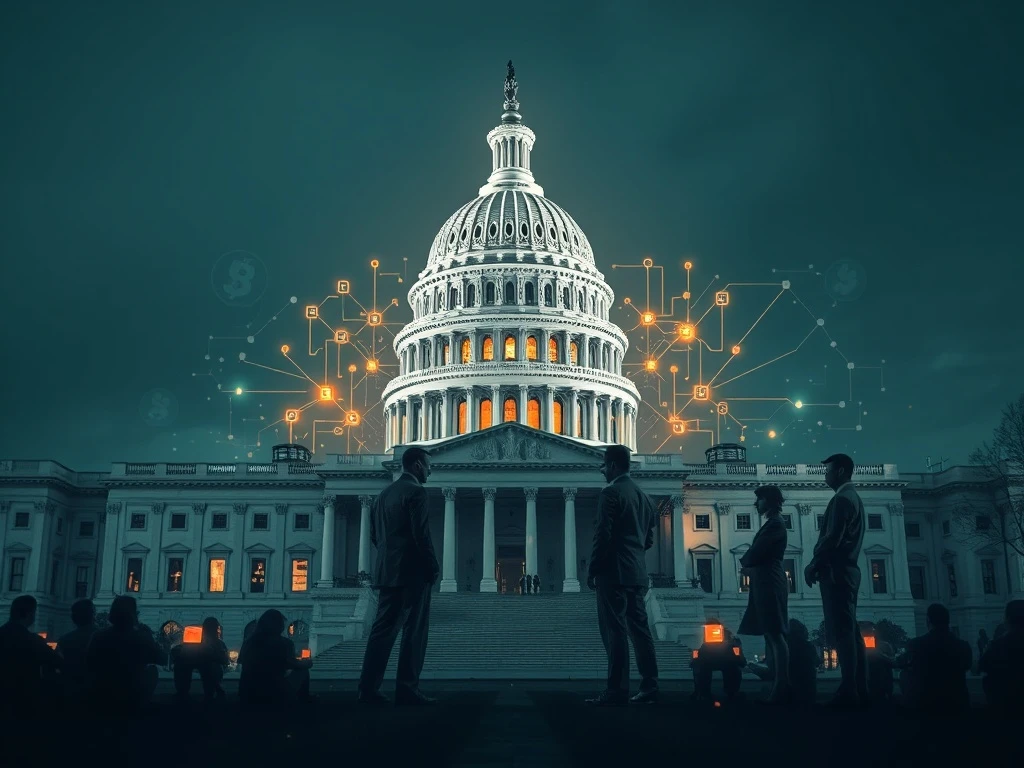Crucial US Crypto Regulation: Lawmakers Remain Deeply Divided on Key Digital Asset Bills

As “Crypto Week” in Washington D.C. unfolded, the cryptocurrency industry watched with bated breath. The promise of clear US crypto regulation, a long-sought goal, once again found itself entangled in political gridlock. Day four saw continued, intense debates among US lawmakers, highlighting deep-seated divisions that threaten to stall vital legislation poised to shape the future of digital assets in the country. This ongoing struggle underscores the complex challenges of integrating novel technologies into existing legal frameworks, particularly when political interests diverge so sharply.
The Stalled March Towards US Crypto Regulation
The legislative agenda for “Crypto Week” was ambitious, featuring anticipated votes on several critical pieces of legislation. These included the Clarity Act, designed to provide regulatory certainty for digital assets; the GENIUS stablecoin bill, aimed at establishing a framework for fiat-backed stablecoins; and the Anti-CBDC Surveillance State Act, which seeks to prevent the creation of a central bank digital currency (CBDC) that could infringe on privacy. However, progress has been notably slow, largely due to political gridlock over proposed amendments.
- Clarity Act: Seeks to define digital assets and provide a clearer regulatory path.
- GENIUS Stablecoin Bill: Focuses on consumer protections and anti-money laundering provisions for stablecoins.
- Anti-CBDC Surveillance State Act: Aims to restrict government development of a CBDC, citing privacy concerns.
Lawmakers spent considerable time debating a wide array of issues, from consumer protections and anti-money laundering (AML) provisions to banking safeguards and measures to prevent conflicts of interest within the executive branch. The inability to reach consensus on these amendments has created significant hurdles for the passage of these crucial bills, leaving the crypto industry in a state of continued uncertainty regarding US crypto regulation.
Why Crypto Lawmakers Are Deeply Divided
The core of the legislative stalemate lies in fundamental disagreements between Democratic and Republican crypto lawmakers. While there’s a shared understanding of the need for innovation and competitiveness in the digital asset space, the approaches to achieving these goals differ significantly. Representative French Hill, a Republican, championed the GENIUS stablecoin bill, emphasizing its robust consumer protections and AML provisions as essential for American competitiveness.
Conversely, Democratic Representative Maxine Waters emerged as a vocal critic, particularly concerning potential conflicts of interest. Waters highlighted a specific loophole, arguing:
“This bill has a policy statement that elected officials like members of Congress and senators, as well as government officials, cannot issue their own stablecoin, but do you know who Republicans did not ban? The president and the vice president are the only elected officials who can have a crypto business.”
This point of contention—barring the executive branch from issuing, endorsing, or promoting cryptocurrencies—has become a major sticking point for many Democratic lawmakers. What initially seemed like a bipartisan push for comprehensive digital asset regulation now faces the risk of losing crucial Democratic support, potentially forcing concessions that may not be favorable to the crypto industry’s broader goals.
The Hurdles Facing Stablecoin Legislation
The GENIUS stablecoin legislation, despite its proponents’ arguments for robust consumer protections and AML measures, faces significant opposition regarding its proposed backing mechanisms. Representative Waters raised concerns about the stability of stablecoins if their reserves include uninsured deposits or other digital assets, rather than solely cash and short-term Treasury securities. She warned that such provisions could destabilize the financial system and potentially lead to a bank run, with the bailout costs ultimately falling on US taxpayers.
The debate around stablecoin legislation highlights a critical tension:
| Pro-Stablecoin Bill Arguments | Concerns Raised by Opponents |
|---|---|
| Ensures American competitiveness in digital finance. | Potential conflicts of interest for executive branch officials. |
| Includes robust consumer protections. | Inadequate provisions for backing stablecoins (e.g., uninsured deposits). |
| Incorporates anti-money laundering (AML) provisions. | Risk of financial instability and taxpayer-funded bailouts. |
| Provides regulatory clarity for the stablecoin market. | Lack of comprehensive oversight for all forms of digital assets. |
These differing viewpoints underscore the complexity of crafting legislation that balances innovation with financial stability and ethical considerations.
Navigating Digital Asset Bills: Beyond Conflicts of Interest
While the executive branch’s involvement in the crypto sector dominated much of the debate—and is the subject of Senator Adam Schiff’s proposed Curbing Officials’ Income and Nondisclosure Act (COIN)—other secondary issues also contributed to the ongoing regulatory gridlock. National security implications and broader financial stability concerns were also thoroughly debated. The discussion extended beyond just stablecoins to the overall impact of digital assets on the traditional financial system.
The challenge for lawmakers is to create a framework that fosters technological advancement without introducing systemic risks. This involves meticulous consideration of how various digital asset bills interact with existing financial regulations and national security protocols. The comprehensive nature of the proposed legislation means that agreement is required on a multitude of complex technical and policy points, making consensus building a slow and arduous process.
The Future of Regulatory Gridlock in Crypto
The current state of regulatory gridlock in US crypto policy presents a significant challenge for the digital asset industry. Without clear federal guidelines, businesses may face an uncertain operating environment, potentially hindering innovation and investment within the United States. The ongoing debates, while frustrating, are a necessary part of establishing a robust and secure regulatory framework. The ability of crypto lawmakers to bridge their divides will ultimately determine the pace and direction of digital asset adoption and development in the US.
For the crypto community, understanding these legislative hurdles is crucial. It highlights the importance of continued engagement with policymakers and advocating for clear, balanced regulations that promote both innovation and consumer protection. The outcome of these legislative efforts will not only shape the American crypto landscape but also influence global regulatory trends. As the debates continue, all eyes remain on Washington D.C., awaiting the pivotal decisions that will define the future of digital assets.





